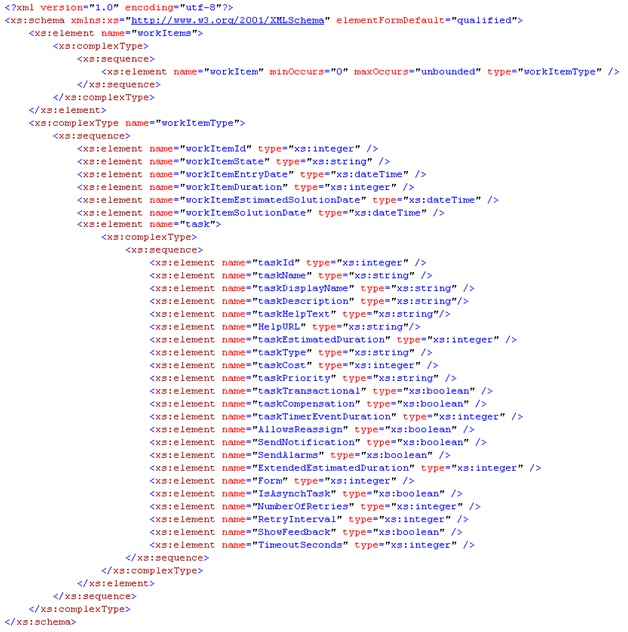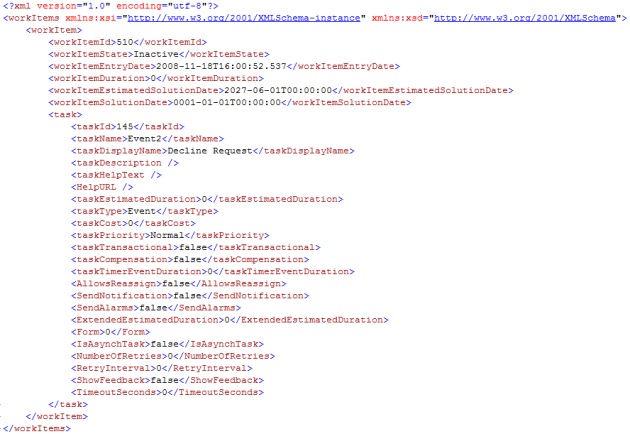GetEvents
From Business Process Management, BPM and Workflow Automation Wiki | BizAgi BPMS
<keywords content="keywords"> getEvents, getevents, getEventsAsString, geteventsasstring, get Events, get events, SOA Layer, soa layer, WorkflowEngineSOA, workflowenginesoa, Workflow Engine SOA, workflow engine soa </keywords>
Contents |
getEvents
A method from the WorkflowEngineSOA web service used to retrieve Intermediate Event type tasks from an external application. This document also applies to the method getEventsAsString.
Description
This method receives an XML with several filters that will be used to get only events meeting those search criteria. The method getEvents receives and returns an XmlDocument while getEventsAsString receives and returns an XML in string format.
Input Data
The following is the schema of the expected XML (copy it from here):
Parameter 1 (XmlDocument or String Type)
BizAgiWSParam: Root node. All possible filters are included here and are optional. If more than one search criterium is used, the result would be only activities complying with all the conditions.
domain: Search events whose assigned user belongs to this domain.
userName: Search events whose assigned user is the one indicated here.
radNumber: Events belonging to this creation number (case number).
processName: Gets events of this process (enter the Name, not the display name).
Example
With the following XML the events of case with creation number 351 will be returned:
Output Data
The schema of the returned XML is as follows (copy it from here):
The response includes information of the events matching the query. Here is the description of each data contained in the returned XML.
workItems: This is the root node of the response; it contains a "workItem" node for each event included in the result.
workItem: This is a specific event (an instance of a task) of the process that is active for a case.
workItemId: Identification number or key of the task.
workItemState: State in which the task is.
workItemEntryDate: Date and time when this task was reached.
workItemDuration: Is the estimated duration, in minutes, for this task.
workItemEstimatedSolutionDate: Is the task’s estimated solution date.
workItemSolutionDate: The actual date on which the task was completed.
task: Contains information about tasks corresponding to the event.
taskId: Identification number or key of the task.
taskName: Name of the task.
taskDisplayName: Display name of the task.
taskDescription: Task’s descriptive text.
taskHelpText: Task’s help text.
HelpUrl: URL with information of the activity.
taskEstimatedDuration: Is the estimated duration, in minutes, for the task.
taskType: Type of task.
taskCost: The estimated cost of the task. This value, like the estimated dates, is configured and determined by the designer of the process.
taskPriority: Fulfillment priority of the task.
taskTransactional: An indicator stating if a task is transactional.
taskCompensation: States if this is a compensation task.
taskTimerEventDuration: If this is a timer task, it will contain its duration in minutes.
AllowsReassign: A marker showing if this task may be reassigned to another user.
SendNotification: Indicates if an email must be sent to a user informing of the availability of the task.
SendAlarms: Indicates if an email must be sent to the assigned user informing that the task is at risk of being overdue.
ExtendedEstimatedDuration: Estimated extended time duration.
Form: Reserved for future use.
IsAsynchTask: Specifies if this is an asynchronous task or not. Usually used for interfaces.
NumberOfRetries: Applies for asynchronous tasks. Is the number of automatic retries for the task in case it fails (an exception is thrown).
RetryInterval: Applies for asynchronous tasks. Is the time (in minutes) between each retry.
ShowFeedback: Applies for asynchronous tasks. Indicates if the user is to be informed when an error occurs.
TimeoutSeconds: Applies for asynchronous tasks. Time (in seconds) the asynchronous task will wait for the external system to respond.
Example
The following is the XML in response to the one sent as an example:
Go to SOA Layer <comments />




